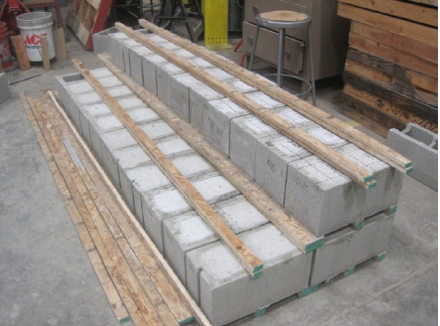1 Ph.D., S.E., Associate Professor, Architectural Eng. Dept., California Polytechnic State University – San Luis Obispo, California, 93407, USA, jmwangi@calpoly.edu
2 Graduate Student, Architectural Eng. Dept., California Polytechnic State University – San Luis Obispo, California, 93407, USA, ebateman@calpoly.edu
3 Ph.D., S.E., Professor, Architectural Eng. Dept., California Polytechnic State University – San Luis Obispo, California, 93407, USA, cbaltimo@calpoly.edu
ABSTRACT
When hollow concrete masonry is used for construction in high seismic regions, structural designs typically require fully grouted walls. For a fully grouted 200x200x400 mm (8x8x16 in.) concrete masonry unit (CMU), 52 percent of total volume is grout. Grouting process is labor-intensive, time consuming and has a high energy demand due to requirements of consolidation in each and subsequent grout lifts. Self-consolidating grout with admixtures has been successfully used without segregation in wall lifts of up to 3.86 m (12.67 ft.) in height. The admixtures used in these grouts are very sensitive to the chemistry of the mix and the sensitivity can be an issue for performance consistency. Eliminating the proprietary admixture from the mix design can have benefits. Sustainable grout where cement is replaced with fly ash and/or blast slag has self-consolidating grout flow properties. This paper investigates sustainable self-consolidating grout mixes without admixtures.
This paper reports on the investigation of compression strength and gives general consolidation observations of self-consolidating characteristics of no vibration/no admixture grout made by substituting various proportions of Portland cement with Type F fly ash and/or ground granulated blast furnace slag (GGBFS). The percentages of Portland cement replacement were 0%, 50%, 60%, and 70% for Type F fly ash and 0%, 60%, 70% and 80% for Type F fly ash and GGBFS.
Compression test specimens were made from individual 200x200x400 mm (8x8x16 in.) concrete masonry hollow core units and dry cured at 7, 14, 28, 42, and 56. Compression test specimens for 130 days dry cured period where cut from testing walls. Consolidation testing specimen walls were built to a height of 3.86 m (12.67 ft.) and 1.22 m (4.0 ft.) length using 200x200x400 mm
(8x8x16 in.) CMU. The relative performance was assessed by comparing to traditional grouted masonry and evaluating consolidation characteristics around mortar fins and reinforcement at 130 days as well as compressive strength of the grout at various wall heights.
KEYWORDS: self-consolidating grout, conventional grout
349.pdf



